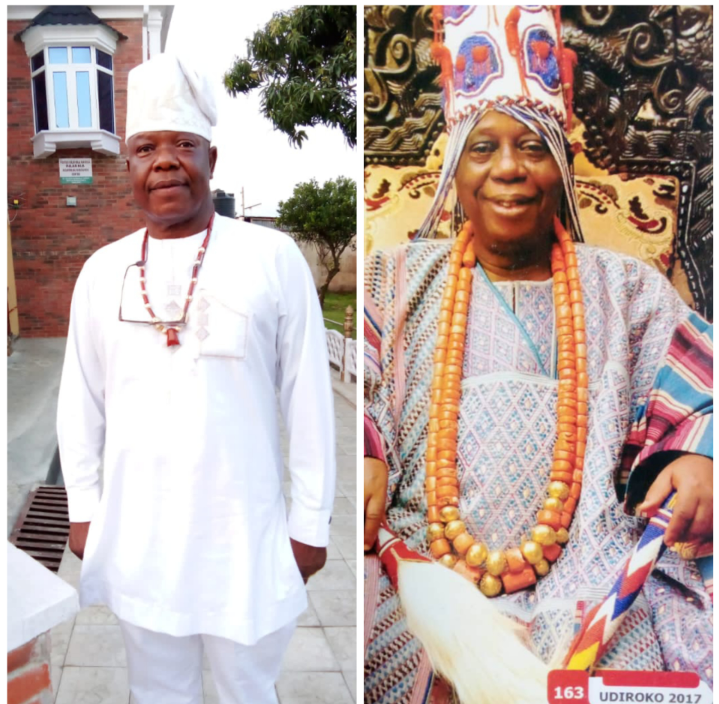BY AYO FAJANA

Ado people will be agog today, the 6th of June, 2024 to celebrate the annual Oitado festival.
Oitado festival is part of Ado traditions and indeed one of the ethnic enclaves of our culture. It is believed that Ado people adopted the festival from Ile-Ife. The festival is universally acquiesced by Ado people. Children were neither known to be sick during the annual Oitado festival and for the sick ones; mothers constantly looked forward to the jamboree as a means of their rejuvenation. However, it is a collective extravaganza extended with routine and toleration beyond Iremo clan.
The ego cult syndrome of the mytho-mystical dance of the Alafonyos makes the festival a prominent one. The group of six members includes the Aworo, parades in plaited heads with special feminine costumes in appearances differ from the Egigun. Except the Aworo, others fold women wrappers beneath the waist. Aworo imposed a culture of silence and fears on strangers with his camouflage of palm fronds at his waist from the neck. Spectators adore the musical verbal dialogues of flutes, orchestrated with textual lines of humming that brings a pragmatic praise singing. The instruments; supposedly old traditional flute, never shown but hidden at the wall of the palms with fingers to vary the notes, producing baritone of sounds that enveloped the air with a serene satisfaction. These, sometimes provoked a spirit medium.
Aworo Ojo Ogunrin was the head of Afonyo cult till 2009. During his days, he showed credible stamina even as an old man, his energy seemed boundless. He was the very alert among the group with a parrot plume firmly fixed by his buccal cavity and he did not seem to change over until the end of the jamboree.
Oitado festival was of the early settlers particularly the original Iremo and the early descendants of Ewi. This pioneer-mania with allied ego syndrome seemed in history to be part of the conventions during their great jungle exploration from Ife in search of a new dominion. Indeed, history confirmed that the Alafonyo’s blazed forth ahead of the immigrants’ community from Ife via Benin forest to Ado.
In Ado, it later became a collective extravaganza extended to other clans, particularly Inisa, Isamo, Idemo, Iyere, Ilemo. Alafonyo moved the taste of the elites and the nobility alike, some chiefs were included in their annual propitiatory offerings as they were hosted with good meals of pounded yam and isapa soup, sometimes harbored for considerable nights during the period of the annual festival. Offering sacrifices were made in grooves and shrines to commemorate their dynastic origins and appease the gods – the bringer of good fortune.
At the eve of the festival, there was a total ritual incident, i.e initiation (Isunle); this crystallizes in the making of begotten sons, a major condition for statecraft. At the dawn from Oke-Egbe (Afonyo groove), libation and prayers were offered at Owa Akinla,, followed by wrestling competition (Udi) at Imogun Ijofi amid funfair in the afternoon with actions, music, dance and décor before a special homage to the palace via Ita Shrine at Ilegemo and Ojido Shrine. Indeed, Alafonyo played a pivotal role in the installation of the Oba.
Elefon is a god of fertility and one of the leading gods of Oduduwa. Her role at Ife earned the nickname
Elefon-Oparakutaku, Ayan, Eyo, Obeyo, Egigun lila ko ti’fe a
Tatari ‘bu Orisa, Oke-igbe in ko mo gbeun, Oni gbe gbe lori ora re.
Meaning a Star winner amidst contemporary gods; and for reasons of this great feat, adherents named their children after the god of Elefon- Elefontade, Elefonteye, Asefon etc. These eventually became some of the major names given to the children of the believers.
Oral history as a major source sometimes could be subjected to distortions of various kinds due to considerations, collapsing of chronology and instances of traditions becoming larger than life, yet, underlying every legend is an historical vent and, in every legend, there is a kernel of truth; I therefore took those challenges and penetrated beyond the succulent pericarp of a mere local historian; our forefathers held it and I verily believed that;
After their settlement in Ado, there were firm resolve twice made from Ile-Ife to recover the Elefon god, and the contention was that, there is no version elsewhere in Yoruba land The plot was thwarted while the bogus phantoms were soon rounded up as Ifa oracle unveiled the secret design against Aworo Elefon.
The dramaturge were six originally until the escapade of one representing Isamo during an expedition at the groove; this circumstances led to the witticism as Ado averred- Omo Afonyo mefa lori Egbe, Ijo, ko kan,ti- ko libe, ni Ke’run; the extinction has marked eerie precision in the game.
Oral history held it that the very one entrapped into the snares and sinew of the mother god (Elefon) took the hardest task yearly as the invisible blew his whistle for 18 days (Isan meji) after the completion of the festival.
List of some notable participants of the old.
Ojo Ogunrin (Aworo)
Eyebiokin (Idemo)
Okiji Amule bi’Ibon (Iremo)
Olode Fajemilusi (Iremo)
Igi oroko (Ulemo)
Agba- Ire (Inisa)
Oba koko (Ulemo)
Bose Amule (Uremo)
Ajibola (Omo Agba Ire)
Sunday (Omo Amule)
Ajangbala, (Iyere)
Boi Agbaje (Inusunja)
Yesufu Olode (Omo Fajemilusi)
Ayo Fajana writes from Ado-Ekiti. He is the CEO Centre for Culture Renaissance, Ado-Ekiti.
